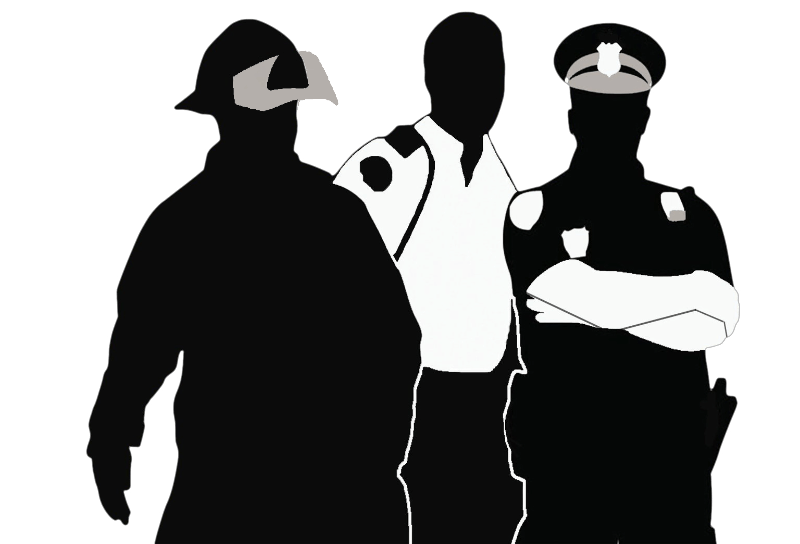Trauma
Trauma
Emergency Service Workers see things that no one should have to see, do things that no one should have to do, and go places no one should have to go. Dispatchers hear things that no one else should have to hear. Corrections officers see the worst conduct in the worst people in our communities. They console the inconsolable, encounter the unthinkable, and are exposed to some of the cruelest, most tragic moments life has to offer. At times, many of them need psychological help but are stymied in their efforts by stigma, the fear of looking weak, and a lack of culturally competent clinicians who understand first responders and the culture in which they work.
First-responder work is taxing for the individual and his or her family. A community of peers: Because of the stigma against seeking mental health support, first responders can suffer for years. Many teeter on the edge of suicide or divorce. They believe no one but another first responder or first responder familycan understand them. They are isolated, often believing they are the only ones dealing with traumatic stress, a failing marriage, substance abuse or organizational betrayal. Bonding with others who share similar experiences and similar concerns is in itself healing.
Everyone responds differently to trauma, and everyone handles and copes with trauma differently. Untreated, trauma will feel overwhelming and unmanageable.
Trauma differs from Post Traumatic Stress (PTS) or Post Traumatic Stress Disorder (PTSD)
“Trauma is what happens to you. Tragedy is what happens to other people.”
For information regarding both, please refer to the Post Traumatic Stress Tab in this section
Symptoms:
There are three sets of trauma symptoms. These include the physical symptoms of exaggerated startle response, hypervigilance, and mood irritability; the intrusive symptoms of memories of the event in the form of conscious intrusive memories, nightmares, and flashbacks; and the avoidant symptoms of avoiding the scene of the incident, a gradual withdrawal from other life activities, and a feeling state of emotional numbness. If the disrupted health domains and/or any of the three sets of symptoms are present after 30 days, the individual has developed PTSD, a condition that will last until death, if it is not treated. (These materials have been discussed in greater detail elsewhere2 and the interested reader is referred there.)
Treating Trauma in First Responders
To date, much of the scientific focus on treating trauma has focused on the needs of victims of combat and rape. A basic approach has been to utilize one basic counseling approach such as cognitive behavior therapy,3 and, if needed, a second intervention, such as medicine and some form of relaxation exercises. This approach has worked for some victims but not all victims. This approach is even more problematic for first responders, as they are not apt to discuss the psychological distress. If anything, they might speak about the physical symptom of hypervigilance on subsequent calls or the avoidant symptom of wanting to quit. The treatment interventions noted above are not targeted symptoms approaches with the end result that many first responders stop treatment.
This essay proposes a multi-modal psychological trauma approach for first responders in which there is a specific treatment intervention for any of the three disrupted health domains or any of the three sets of disordered symptoms. Psychological trauma and PTSD may disrupt the health domains of reasonable mastery, caring attachments to others, and a meaningful prosocial purpose in life and victims of trauma may exhibit physical, intrusive, and avoidant symptoms. (See 2,4 for a detailed discussion of psychological trauma and PTSD). Below are some examples from the emerging empirically based individual studies and literature reviews of empirical-based research. All references are listed in full elsewhere.
Confidentiality: Trust is the cornerstone for healing. These first responders need to know that what they reveal will not be shared with anyone without their explicit, written permission.
Peer support: First responders trust their peers before anyone else, sometimes even their families. It makes sense to trust someone who has walked in your shoes. As a clinician, I’ve never shot a gun, been in a fight, pulled someone out of a crushed car, or married a first responder.
Self-Care for Emergency Service Workers
-
Set boundaries: Balance the pressures of work with other activities
-
Get enough sleep: maintain physical health and allow for rest
-
Eat healthy foods: Support mental and physical health with good nutrition
-
Be active: Boast feel-good endorphins with physical activity
-
Connect with friends and loved ones: Process emotions by opening up
-
Use peer support: Share with colleagues who have similar experiences
-
Setting boundaries can be the most difficult coping strategy, but they are critical for the profession.
